
Get up to 3 quotes by filling in only 1 quick form

Compare quotes and find yourself the best deal

Increase the value of your home by installing a new boiler
- Householdquotes.co.uk
- Cheapest Way to Heat a House
What is the Cheapest Way to Heat a House in the UK? 2024 Guide

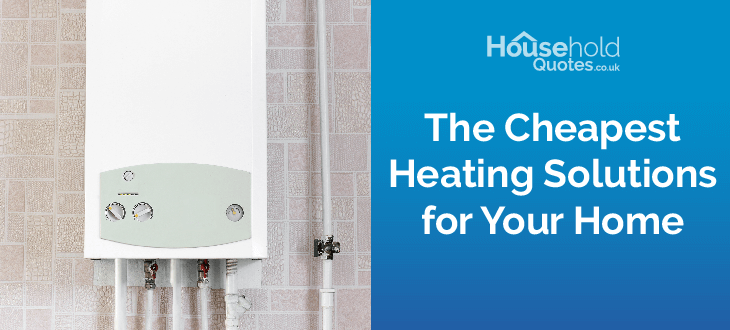
With the constantly fluctuating energy costs in the UK, it makes sense that homeowners are on a quest to find the cheapest way to heat a house. If you are also looking for the cheapest heating solutions on the market, stick around. In this guide, you can learn more about how you can make the most of your appliances to reduce your heating expenses.
In this article, we’ll be explaining the following points:
- What the cheapest and most efficient heating systems are
- What affects the cost of heating your home
- How to save money and reduce your energy bills
- How to find and hire an installer
Once you have more information about heating systems and their cost effectiveness, you might be interested in making some changes to your home. However, picking the right appliances, fuel type, and the best installer for the job are not choices you should be taking lightly.
When looking for the cheapest way to heat your home, you will want to make an informed decision by comparing products and services across companies. We know that doing this research can take hours, if not days. Fortunately, you can now avoid this tedious work, as we have done the research for you.
All you have to do is fill in our 30-second form to request quotes for cheap heating systems from reputable heating engineers in your area. You can then easily compare the information you receive to find the best deal for your home.
Click below to request up to 3 free quotes today!
- Quotes from local installers
- Payment by finance available
- Save up to £975
It only takes 30 seconds

What is the cheapest way to heat your home?
Currently in the UK, the cheapest forms of heating are:
- Gas boilers
- LPG boilers
- Electric boilers
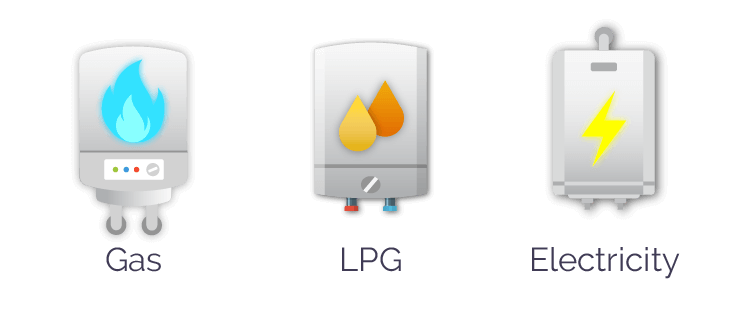
The fuel type that your appliances run on plays a major role in the total costs involved in heating your home. While fuel prices have increased over the years, gas remains one of the most affordable options, followed by LPG and electricity.
Alongside fuel, the efficiency of your heating system directly contributes to your annual energy expenses. A high-efficiency boiler converts fuel into usable energy in a way that wastes as little fuel as possible. As a result, you will spend less on fuel over time.
To be able to easily compare the estimated annual costs of warming up your home, we have created an overview below of the average fuel costs for gas, LPG, and electricity. These numbers are for a medium-sized house with a boiler that runs on one of these fuel types.
| Fuel Type | Efficiency (%) | Cost per kWh | Annual Cost |
|---|---|---|---|
| Gas | 92–95% | 7p | £820 |
| LPG | 92-95% | 7.7p | £840 |
| Electricity | 99% | 27p | £1,450 |
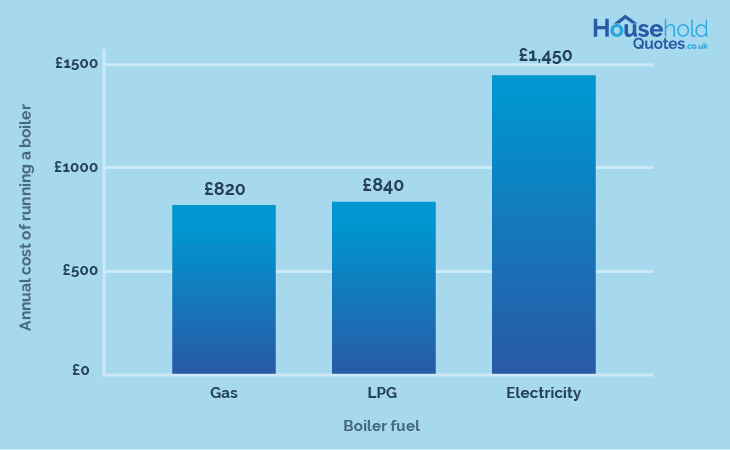
It is important to note that these figures are estimates that are frequently subjected to change, as fuel prices continue to fluctuate. This doesn’t mean that you can’t make choices that will help you warm up your home for less.
One of the main things you can do to enjoy cheap heating is to choose the right heating system for your home. The average UK home is a 3 bedroom setup, so the best boiler for a 3 bedroom house can cost about £1,100 to £2,000 on average (when considering standard boilers like conventional, system or combi boiler models). To help you get a clearer picture of what options are available in the UK, we go through a few heating solutions below.
Gas boiler

As the cheapest home heating option in the UK, it is no surprise that the gas boiler is also the most popular choice among homeowners.
Gas is a highly efficient fuel type, which, combined with a quality boiler, allows you to warm up your home for less. On average, the best gas boilers for home heating will cost around £1,600 to £2,500 for a 3-bedroom house. Check our dedicated page to learn more about the best combi boilers in the UK today.
However, while it might have its advantages for your wallet, a gas boiler will not do much when it comes to helping you reduce your carbon footprint. If you are looking for a more sustainable option, you will want to look into appliances such as biomass boilers or solar panels.
Despite being the cheapest option, fossil fuels can be very volatile. This is one of the reasons the UK plans to have gas boilers banned in newly built homes by 2025 to decrease fossil fuel dependence. It may be worth noting that parts for gas boilers may become more expensive in the future.
Oil boiler
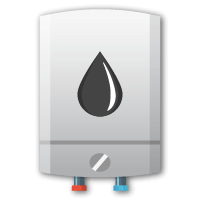
An oil boiler is a form of cheap heating suitable for homes that are not connected to the gas grid or for which an electric boiler is not feasible. Depending on the size of your property, you can expect the oil boiler price to be somewhere between £1,200 and £4,500 for a new oil boiler, excluding installation costs.
As a fuel type, oil is generally a cost-effective option with an efficiency rate of around 92-95%. However, like gas boilers, they are not the most sustainable home heating option on the market. Nevertheless, you might be able to combine your oil boiler with a renewable energy source, such as solar panels, to heat your home in a more environmentally friendly way.
Electric boiler
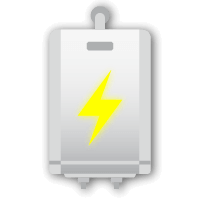
Electric boilers are a great option for homes that do not have access to the gas grid. They are also a more environmentally conscious choice, as they do not require burning natural resources to operate. Even so, they are not the most sustainable appliance available. If your main concern is lowering your carbon footprint, you will want to explore other options, such as biomass boilers.
While it is not really the cheapest way to heat your home, an electric boiler might be the most efficient choice for you, depending on your situation. The estimated cost of new electric boilers is around £500-£2,500, minus installation costs. At the same time, electricity is a more expensive fuel type, which you will have to take into account when it comes to your heating bills.
Heat pumps, which run on electricity are so efficient that they will reduce your electric heating costs by 3-4 times. To learn more, check out our dedicated page about heat pumps vs gas boilers and our electric boiler vs gas boiler comparison.
Biomass boiler
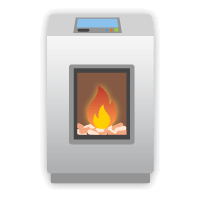
A biomass boiler allows you to heat up your home in a more environmentally friendly manner. This boiler type is fuelled by wood pellets, chips, or logs that are burned to warm up your water supply.
With an efficiency rate of 89–91%, biomass boilers in the UK also allow you to save on your heating bills in the long run. However, you should be aware that these appliances are more expensive than others, with their price ranging between £4,000 and £21,000 for a new boiler.
Hopefully, now you have some more clarity when it comes to the estimated new boiler price in the UK this year. However, you should keep in mind that the figures we reference are only estimates and that the total cost for your home can only be determined with advice from a specialist.
Solar panels

If you are looking for a great way to supplement your heating system and lower your overall energy expenses and environmental impact, you might want to consider installing solar panels. These appliances convert sunlight into usable energy for your home and they can allow you to reduce your yearly energy bills once installed.
The estimated price of a solar panel system in the UK today ranges between £5,000 and £12,000. The total cost will depend on the size of the installation you need, as well as on the manufacturer and installer you opt for.
Air source heat pump
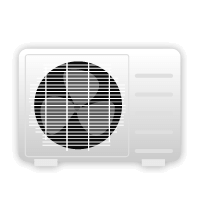
Air source heat pumps are ideal for homes that aren’t connected to the gas grid. To make the best of your appliance, you will need to ensure that your home is well-insulated. Air source heat pumps work by extracting heat from the air outside, passing it through a heat exchanger to transfer the heat to your home.
It is important to bear in mind that air source heat pumps are a more expensive heating solution. Excluding installation costs, you can expect to spend anywhere from £2,500 to £7,000 on a new air source heat pump. However, in the long run this system can allow you to save on your yearly heating bills.
Ground source heat pump

This appliance uses a small amount of electricity to transfer heat from the ground to attend to your heating and hot water needs. Ground source heat pumps are some of the most sustainable heating solutions that also allow you to cut down on your yearly heating expenses.
Even though you will reap the benefits of a ground source heat pump over time, the initial cost of having one installed for home is quite high. As an estimate, prices for a new ground source heat pump range from around £12,000 to £30,000, excluding the costs involved in installation.
Not sure whether your home will benefit from a boiler or solar panels? Or maybe you’re interested in a ground or air source heat pump? A heating engineer could weigh in. By consulting them, you can receive information tailored to your energy consumption requirements, which can help you determine which appliance is most suitable for your home.
We can help you easily get in touch with specialists near you to get advice for your situation. In just 30 seconds you can request quotes for new appliance and installation costs. We will then put you in touch with local specialists who can assist you further in finding the best heating solution for you.
Click below to get started today!
- Quotes from local installers
- Payment by finance available
- Save up to £975
It only takes 30 seconds

How can you lower your heating costs?
Some of the main things you can do to avoid overspending on your heating bills are: ensure that your home is well-insulated, choose high-efficiency appliances, and use fuel with a high efficiency rate.
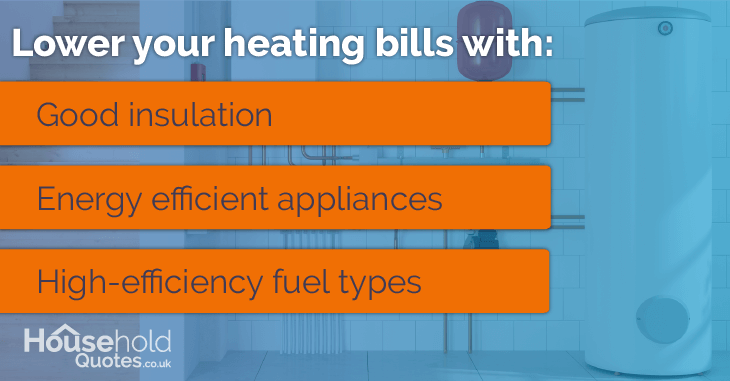
Having effective insulation
If you have poor insulation in your house, the heat your appliances produce quite literally goes out the window. So, if your home is not well-insulated, you are wasting money on unnecessarily high energy bills.
To make your home energy-efficient, it’s best to tackle these problems before investing in a new boiler to heat your home, as you’ll just be ignoring the problems that need solving – and no highly-efficient appliance will help with that.
Having efficient boilers and radiators
If your home is properly insulated but your home still isn’t retaining heat as much as you’d like, the next step is to look at your heating systems, namely your boiler and your radiators.
Before making any new purchases, check whether your current appliances are functioning well. For instance, you can bleed your radiators to rid them of air bubbles that stop the hot water from flowing freely into them and distributing heat.
When it comes to your boiler, you should check if all it requires to operate at its best is some maintenance, or whether it is due for an upgrade. Only an installer can determine which of the two options is best for your situation. You will want to have a heating engineer take a look at your boiler before replacing it.
It’s also worth noting that the type of boiler you currently have and the type of boiler you wish to install will affect your total installation costs. For example, changing from a conventional boiler to a combi involves removing additional units and adjusting the surrounding pipework. Therefore, this type of replacement will cost more than a like-for-like swap. The same applies to back boiler replacement costs.
Using an efficient fuel type
As we have mentioned, the kind of fuel you choose to heat your home with will affect the cost of heating your home. This is why you will want to consider opting for a fuel type with high efficiency rates, to make sure that you don’t overspend on your energy bills.
While you can’t always choose your heating source – if you live off-grid, for example, you may only be able to choose between electricity and LPG – you can choose cost-effective providers with discounts to make sure you do not overspend on your energy bills.
Which cheap heating solution is right for me?
With so many heating options available, it may be overwhelming to choose the one that fits your home the best. What can be helpful in making your decision is to know a bit more about the advantages and disadvantages of some of the systems available.
Below you can learn more about the pros and cons of boilers that run on gas, LPG, and electricity.
Gas boilers
Currently, the cheapest way to heat a house in the UK is by using a gas boiler. Gas is not only a cheaper fuel type, but is also quite efficient. Paired with a high-efficiency boiler, you can avoid spending too much on your energy bills in the long run. For smaller homes with up to two bathrooms, a compact combi boiler can be a space-saving and effective energy solution.
- Cheaper than other heating systems
- Convenient for most homes on the gas grid
- Quick heating times
- Consistent and even heat distribution
- Risk of gas leaks
- Less environmentally friendly than other options
Learn more about high flow rate combi boilers.
LPG boilers
Another one of the cheapest heating solutions on the market is the LPG boiler. This appliance is ideal for homes that are not connected to the gas grid. As a fuel type, LPG has a high efficiency rate that comes at a relatively low cost.
- High energy efficiency
- Cost effective
- Easy to install and maintain
- LPG is a hazardous material
- Higher carbon emissions
Electric boilers
On the somewhat pricer side, you can opt for an electric boiler to warm up your home in a more environmentally-friendly way. With an efficiency rate of about 99% when paired with an energy-efficient boiler, this fuel type could be a great option for your home, especially if it’s not connected to the gas grid.
- High energy efficiency
- Lowers your carbon footprint
- Eliminates the risk of gas leaks
- Quiet when it operates
- More expensive than other heating systems
- Limits to the hot water supply
Hopefully, the characteristics of each heating system have given you a better idea of which option would be most suitable for your home. However, if you still have questions, you should get in touch with a heating engineer who can give you advice based on your situation.
With our service, you have to look no further for a specialist. By clicking below, you can fill in our 30-second form to request quotes from local installers. This way, you can easily find reputable specialists in your area who can help you determine which heating system will allow you to save the most on your yearly energy expenses.
Reach out to heating engineers near you with our simple form.
- Quotes from local installers
- Payment by finance available
- Save up to £975
It only takes 30 seconds

Frequently asked questions
Gas boilers are the cheapest way to heat your home in the UK today. However, if this option is not feasible for your home, there are other options you can explore.
The most cost-effective way to keep your heating on is to use it only when you need it. You can also check what other steps you can take to make sure that no energy is wasted in your home.
Yes, as you would not be using the energy your heating system is producing when your radiators are off. However, it is not feasible to keep them off all the time. To reduce your energy expenses, you can choose to only turn your heating on when you need it and to make sure that your home is set up to be energy efficient.
Depending on whether you choose a ground or air source heat pump or a biomass boiler, the cost of your heating system running on renewable energy can range from £2,500 to £30,000. Before having one of these systems installed, you will want to make sure that they are suitable for your home.
Contrary to what you might expect, it is not cheaper to keep the heating on low at all times. Instead, you will save money in the long run by only turning your heating on when you need it. You should keep in mind that your total heating expenses will depend on other factors as well, such as the appliance and fuel type you use.
Yes, heating your home with a combi boiler costs less than running a conventional boiler. However, there are also other factors you should consider, such as the efficiency of your appliance and the fuel type it runs on, as these directly impact your heating bills.

Sabria Schouten is a content writer dedicated to helping readers make informed decisions when it comes to their energy consumption.
